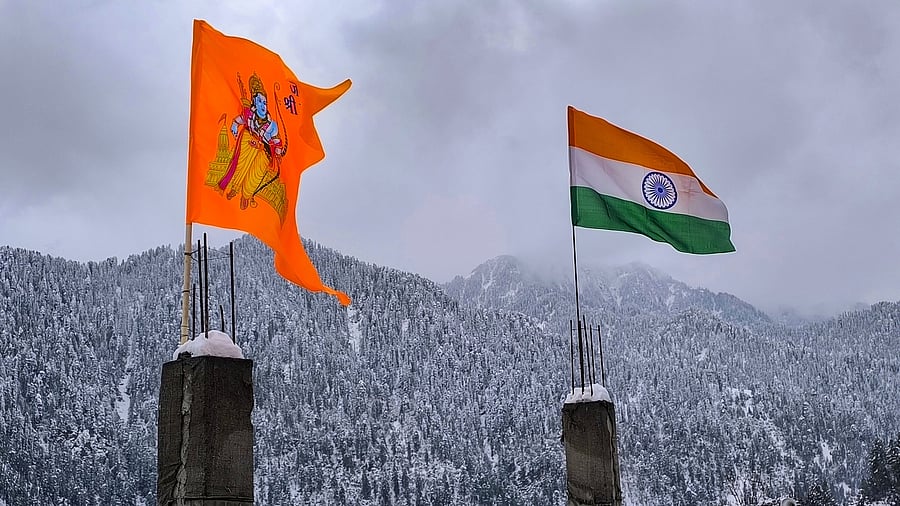
An Indian flag and a saffron flag in the backdrop of snow covered ranges in North India.
Credit: PTI Photo
In a significant and positive move, the apex body of Catholic bishops in India issued new guidelines to educational institutions under its jurisdiction in April to address what it called “emerging challenges due to the current socio-cultural, religious, and political situation” in the country.
According to the guidelines, all educational institutions under its jurisdiction must inscribe the preamble to the Indian Constitution on the main entrance to all schools and must ensure students recite the preamble during daily assemblies. The Catholic Bishops Conference of India (CBCI) has also directed schools to refrain from imposing Christianity on students of other religions, and Catholic schools should have an inter-religious prayer room, known as ‘Sarvadharma Prarthanalay,’ on the school premises.
The Catholic Church operates around 14,000 schools at the elementary and secondary levels, 650 colleges, seven universities, five medical colleges, and over 400 technical and vocational institutions. The Catholic bishops are leaving no stone unturned to promote a climate of respect for all faiths in our country, which is home to diverse religions and ethnicities.
The latest initiative is also seen as an endeavour to reinforce India’s secular ethos at a time when attacks against Christians and minorities by both State and non-State actors are increasing with the rise in Hindu nationalism and religious intolerance.
Despite these efforts to foster peace and harmony, the Christian community in India continues to face targeted violence and hate crimes.
The situation is so alarming that, with Lok Sabha elections underway, Christians have appealed to the national authorities, seeking equal protection and rights for all citizens, regardless of faith. The latest statistics from the United Christian Forum (UCF) show there were around 200 incidents of violence against Christians in the first three months of 2024. UCF is a Delhi-based inter-denominational organisation that tracks atrocities against Christians.
Worse, the attacks continued in April. To cite just three instances, a group of criminals forced themselves at night into the SVD Divine Mission in Bagdehi (Odisha), attacked the priests and teachers, and escaped with cash and valuables. Police arrested a pastor and his associate in Kanpur under charges of “religious conversion attempt.” This was refuted by the pastor of the Assembly of Believers Church, who said it was only a praise and worship Easter Sunday assembly. Parents of students, some Hindu leaders, and others indulged in acts of violence at the Mother Teresa School in Telangana after the management did not allow a student to enter the exam hall. The student, instead of wearing the school uniform, wore saffron attire and beads.
Chhattisgarh, a state known for social ostracization of Christians, is the leading state in assaults against Christians, with 47 incidents of reported violence. Uttar Pradesh ranks second with 36 incidents so far this year. The UCF, in its latest statement, said there is clear evidence of State-sponsored harassment of Christians in UP as the police file false allegations of conversion against the pastors, even for praying at birthday parties and other social gatherings.
In all, there are 19 states in India where Christians are facing threats to their lives for practicing their faith. There are 122 Christians who have either been detained or arrested on the false allegation of conversions so far in 2024, UCF said. It is pertinent to reiterate that Christians are accused of forcible conversion, a long-standing claim of right-wing Hindu groups, which has vehemently been denied. Moreover, Christians are less than 2.4% of India’s 1.3 billion people. The number has remained the same since the 1951 census.
If indeed there are forcible conversions, as alleged by the vigilante groups, they should be challenged and proven in court. Thus far, no one has been found guilty of conversions, nor has any conviction taken place.
Church leaders are unanimous that the attacks are a systematic, deliberate, and conscious push to polarise the atmosphere and show minorities their place. Others are of the view that the aim is to intimidate the community with hate speeches and vandalise churches and educational institutions. The Christian leadership in the country has time and again highlighted their concerns to the authorities, even to those in the highest positions of power, including President Droupadi Murmu and Prime Minister Narendra Modi.
It is high time the authorities took note of the atrocities committed against Christians, rightly condemn such happenings, and ensured that the perpetrators were booked. Unless this normalisation of violence is stopped, the guarantees in our Constitution of the freedom to openly practice any religion and the idea of a secular India will have no meaning.
(The writer is a freelance journalist)